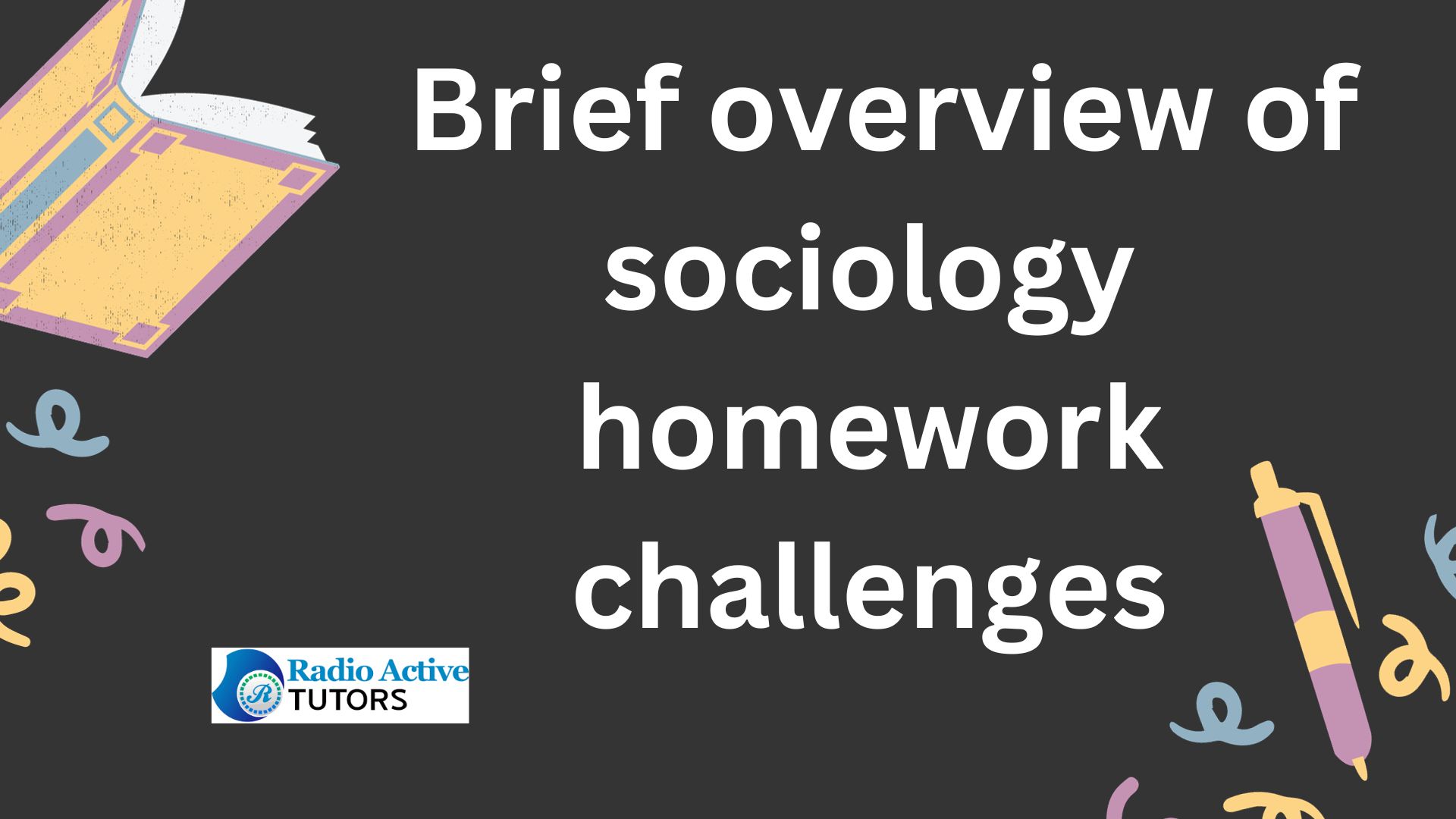New Order Found Please Review the order ASAP for the client to
proceed

Unread Message Found Please check the message ASAP and reply to client


Table of Contents
I. Introduction
II. Why Sociology Homework Matters
III. Common Challenges Faced by Students
IV. Strategies for Effective Time Management
V. Tips for Conducting Successful Sociological Research
VI. Overcoming Writer’s Block in Sociology Homework
VII. The Art of Crafting Compelling Sociology Essays
VIII. Leveraging Online Resources for Sociology Homework Help
IX. Common Mistakes to Avoid in Sociology Homework
X. Frequently Asked Questions (FAQs)
XI. Case Studies: Applying Sociological Theories to Real-life Scenarios
XII. Integrating Technology into Sociology Studies
XIII. Navigating Ethical Dilemmas in Sociological Research
XIV. Seeking Guidance from Professors and Peers
XV. How Sociology Homework Prepares Students for the Future
A. Brief overview of sociology homework challenges

In the complex realm of sociology homework, students often encounter a myriad of challenges that can make navigating the subject a formidable task. The multifaceted nature of sociological theories, ranging from functionalism to conflict theory and symbolic interactionism, poses a significant hurdle for many. Additionally, students may grapple with the intricacies of conducting effective sociological research, struggling to sift through vast amounts of information and discern reliable sources.
Time management emerges as a common adversary, with the need to balance coursework demands against other academic and personal commitments. Overcoming the fear associated with sociology assignments is another challenge, as the discipline demands critical thinking and analytical skills that may be initially intimidating. This comprehensive guide aims to dissect these challenges and provide students with practical strategies, tips, and resources to not only navigate their sociology homework successfully but also to foster a deeper appreciation for the subject.
B. Importance of understanding sociological concepts
Understanding sociological concepts holds profound significance for students immersed in sociology homework. These concepts serve as the foundational building blocks that unravel the complexities of human society, offering valuable insights into social structures, behaviors, and interactions. Proficiency in sociological theories, such as functionalism, conflict theory, and symbolic interactionism, equips students with a lens to analyze and interpret the intricacies of the social world.
Moreover, the application of sociological concepts extends beyond academic pursuits, fostering critical thinking and analytical skills essential for navigating the challenges of everyday life. A comprehensive grasp of these concepts not only enhances academic performance but also cultivates a broader perspective, enabling students to engage meaningfully in discussions on societal issues. This guide underscores the importance of delving into sociological concepts, emphasizing their role in shaping a well-rounded understanding of the world and empowering students to approach their sociology homework with confidence and intellectual curiosity.
C. Purpose of the guide
The purpose of this comprehensive guide for sociology homework is to serve as a beacon of support and empowerment for students navigating the intriguing yet challenging terrain of sociological studies. Recognizing the unique hurdles and complexities associated with sociology assignments, this guide aims to provide students with a roadmap to success. It aspires to demystify the subject, offering practical strategies to overcome common challenges, refine research skills, and enhance the quality of written assignments.
Beyond mere academic assistance, the guide also seeks to instill a deep appreciation for the relevance and impact of sociology in the broader context of society. By fostering a sense of curiosity, critical thinking, and a holistic understanding of sociological concepts, the guide endeavors to not only aid students in their immediate coursework but also to lay the foundation for a lifelong engagement with the dynamic field of sociology.
A. Linking theoretical knowledge to real-world scenarios
The significance of sociology homework lies in its capacity to bridge the gap between theoretical knowledge and real-world applications. In the broader context of “Why Sociology Homework Matters,” the ability to link abstract sociological theories to tangible, real-life scenarios is paramount. This linkage transforms theoretical concepts, such as functionalism, conflict theory, and symbolic interactionism, from abstract notions to powerful tools for understanding and dissecting the complexities of human societies.
By emphasizing the practical relevance of sociological theories, students gain a deeper appreciation for the subject’s impact on social structures, behaviors, and institutions. This aspect of the guide underscores the transformative potential of sociology homework, illustrating how the comprehension of theoretical frameworks extends beyond the classroom, empowering students to navigate and contribute meaningfully to the intricate tapestry of the real world.
B. Developing critical thinking and analytical skills
“Why Sociology Homework Matters” extends beyond the confines of academic achievement; it plays a pivotal role in nurturing and honing students’ critical thinking and analytical skills. Sociology, as a discipline, inherently encourages students to question, analyze, and interpret complex societal phenomena. Engaging with sociological theories and concepts prompts students to develop a keen ability to critically evaluate information, discern patterns, and draw connections between seemingly disparate elements.
Through the systematic exploration of diverse perspectives and societal structures, students cultivate an analytical mindset that not only enriches their academic endeavors but also equips them with invaluable skills applicable in various aspects of life. This guide recognizes the intrinsic link between sociology homework and the cultivation of these cognitive skills, emphasizing the enduring impact of honing critical thinking and analytical prowess throughout students’ educational journeys and beyond.
C. Impact on academic performance and future career
The significance of sociology homework extends far beyond the academic realm, profoundly impacting both current academic performance and future career trajectories. Adeptness in sociological theories and the analytical skills cultivated through sociology homework lay a robust foundation for academic success. Excelling in sociology assignments demonstrates a student’s ability to comprehend complex social concepts, contributing to an overall well-rounded academic profile.
Furthermore, the skills honed in sociology, including critical thinking, research proficiency, and effective communication, are highly transferable and sought after in various professional fields. As the guide explores “Why Sociology Homework Matters,” it underscores how a strong grasp of sociological principles not only enhances academic achievements but also positions students for success in careers that require a deep understanding of societal dynamics, policy analysis, and effective problem-solving. Recognizing the enduring impact on both academic and professional spheres, the guide encourages students to view sociology homework as a strategic investment in their intellectual and career development.

A. Complexity of sociological theories
Navigating the intricate landscape of sociological theories stands out as a central challenge among the common hurdles faced by students in their sociology homework journey. The complexity of theories such as functionalism, conflict theory, and symbolic interactionism can be overwhelming, requiring students to delve deep into abstract concepts and understand their multifaceted applications. The challenge lies not only in memorizing these theories but also in comprehending their implications for real-world phenomena.
The guide acknowledges the difficulties posed by the complexity of sociological theories and offers targeted strategies to break down these abstract concepts into more digestible components. By addressing this challenge head-on, the guide aims to empower students to not only grasp the intricacies of sociological theories but also to appreciate their significance in analyzing and interpreting the dynamics of human societies.
B. Research difficulties
The realm of sociology homework often presents students with a distinct set of challenges, with research difficulties standing out as a common hurdle. Conducting effective and meaningful sociological research requires a nuanced approach, encompassing a thorough understanding of research methodologies, access to relevant academic databases, and the ability to critically evaluate sources. Many students find themselves grappling with the vast amount of information available, struggling to sift through it to extract pertinent data for their assignments.
The comprehensive guide acknowledges these research difficulties and provides students with practical insights into navigating academic databases, refining search strategies, and discerning the credibility of sources. By addressing research challenges head-on, the guide aims to empower students to overcome hurdles and elevate the quality of their sociological assignments through well-informed and meticulously conducted research practices.
C. Time management issues
Among the array of challenges encountered by students in their sociology homework journey, time management issues emerge as a pervasive obstacle. The comprehensive guide recognizes that balancing the demands of multiple assignments, classes, and personal commitments can be particularly daunting for students engaging with the complex subject matter of sociology. Effective time management becomes crucial as students navigate intricate sociological theories, conduct research, and craft insightful essays.
The guide addresses these time management challenges by offering practical strategies, such as creating personalized study schedules, prioritizing tasks based on deadlines and complexity, and incorporating productivity tools. By equipping students with the tools to manage their time effectively, the guide aims to alleviate the stress associated with time constraints, allowing students to approach their sociology homework with greater organization, focus, and ultimately, success.
D. Overcoming the fear of sociology homework
Confronting the fear associated with sociology homework is a significant aspect of the common challenges faced by students. The comprehensive guide acknowledges that the intricate nature of sociological theories and the analytical skills required can be intimidating, leading to apprehension among students. Overcoming this fear involves not only understanding the subject matter but also building confidence in one’s ability to navigate and excel in sociology assignments.
The guide addresses this challenge by providing motivational insights, encouraging students to view sociology homework as an opportunity for intellectual growth rather than a daunting task. Practical tips for breaking down complex theories, seeking support when needed, and celebrating small victories are integrated into the guide to empower students in overcoming the fear of sociology homework. By fostering a positive mindset and providing actionable strategies, the guide aims to transform anxiety into a catalyst for success in the captivating realm of sociology studies.

A. Creating a personalized study schedule
Creating a personalized study schedule stands out as a cornerstone in the broader strategy for effective time management, particularly when tackling sociology homework. The comprehensive guide recognizes the unique demands of sociological studies and underscores the importance of tailoring study schedules to individual preferences and commitments. This strategy involves a thoughtful assessment of one’s daily routines, peak productivity hours, and existing obligations. The guide encourages students to allocate dedicated time slots for different aspects of sociology homework, such as theory comprehension, research, and writing.
By customizing study schedules, students can maximize their efficiency, maintain a balance between academic and personal life, and ultimately enhance their mastery of sociological concepts. This practical approach empowers students to take control of their time, fostering a more structured and productive approach to the diverse challenges posed by sociology coursework.
B. Prioritizing assignments based on deadlines and complexity
Prioritizing assignments based on deadlines and complexity is a pivotal strategy within the overarching framework of effective time management, as outlined in the comprehensive guide for sociology homework. Recognizing the diverse nature of sociological assignments, this strategy encourages students to adopt a systematic approach to their workload. By assessing deadlines and evaluating the complexity of tasks, students can strategically allocate their time and energy to ensure timely and high-quality submissions.
The guide emphasizes the importance of tackling assignments in order of urgency while considering the level of difficulty each task presents. This prioritization not only prevents last-minute rushes but also allows students to dedicate more focused attention to assignments with greater complexity. By instilling this strategic mindset, the guide empowers students to navigate their sociology homework with efficiency and poise, ultimately contributing to a more rewarding and successful academic experience.
C. Utilizing productivity tools and techniques
In the pursuit of effective time management for sociology homework, the comprehensive guide underscores the significance of utilizing productivity tools and techniques. Acknowledging the digital age and the abundance of resources available, the guide encourages students to leverage technology to streamline their work processes. Productivity tools such as task management apps, calendar apps, and note-taking software can be instrumental in organizing assignments, setting reminders, and maintaining a structured study routine.
Additionally, the guide introduces techniques like the Pomodoro method, encouraging students to break down their study sessions into focused intervals with short breaks to enhance concentration and productivity. By integrating these tools and techniques into their workflow, students can optimize their time, minimize distractions, and elevate the efficiency of their sociology homework endeavors, ultimately contributing to a more successful and stress-free academic experience.

A. Utilizing academic databases and resources
In the comprehensive guide for sociology homework, a key focus is on equipping students with effective strategies for conducting successful sociological research, and at the forefront of these strategies lies the utilization of academic databases and resources. Recognizing the vast wealth of information available in the digital age, the guide encourages students to explore reputable academic databases, journals, and libraries to access scholarly articles, research papers, and relevant publications.
By navigating these databases, students can delve into the latest sociological research, gaining valuable insights to support their own assignments. The guide emphasizes the importance of honing research skills, including advanced search techniques and citation management, to ensure the retrieval of accurate and credible information. This emphasis on utilizing academic databases and resources serves as a foundational element in empowering students to elevate the quality and depth of their sociological research, fostering a more robust understanding of complex sociological concepts.
B. Effective use of keywords
Within the comprehensive guide for sociology homework, a critical facet of conducting successful sociological research is highlighted— the effective use of keywords. Recognizing that precision in search queries is key to uncovering relevant and targeted information, the guide encourages students to carefully select and employ specific keywords related to their research topics. By refining and expanding these keywords, students can enhance the efficiency of their searches and discover pertinent literature that contributes to the depth and breadth of their sociological understanding.
The guide advises on the importance of experimenting with various combinations of keywords and utilizing advanced search features in academic databases to tailor searches to specific research needs. This emphasis on the effective use of keywords equips students with a valuable skill set, enabling them to navigate the vast landscape of sociological literature with precision and discernment, ultimately enriching the quality of their research endeavors.
C. Evaluating the credibility of sources
In the pursuit of successful sociological research, the comprehensive guide places a strong emphasis on the crucial skill of evaluating the credibility of sources. Acknowledging the abundance of information available, the guide recognizes that not all sources are created equal, and students need to discern the reliability and validity of the materials they consult. The guide advises students to critically assess the authority, accuracy, currency, and objectivity of sources, particularly when drawing on online platforms and databases.
By providing a set of criteria for evaluating credibility, the guide empowers students to navigate the intricate landscape of sociological literature with discernment, ensuring that their research is built on a foundation of trustworthy and academically sound information. This focus on source evaluation becomes an invaluable tool in enabling students to contribute to the academic discourse with confidence and precision in their sociology homework.

A. Brainstorming techniques
Overcoming writer’s block is a pivotal aspect of the comprehensive guide for sociology homework, and at its core lies the incorporation of effective brainstorming techniques. Recognizing that the blank page can be a formidable adversary, the guide encourages students to employ diverse brainstorming methods to unleash their creativity and overcome mental barriers. Techniques such as mind mapping, freewriting, and listing key ideas can stimulate the thought process and provide a structured approach to generating content.
By fostering a creative and open-minded atmosphere, these brainstorming techniques empower students to explore various angles of their sociological topics and to find their unique voice in expressing ideas. The guide underscores that overcoming writer’s block is not just about producing words but engaging in a dynamic process that allows for the discovery of insights and the formulation of compelling arguments in sociology assignments.
B. Creating outlines and rough drafts
Within the framework of overcoming writer’s block in sociology homework, the comprehensive guide underscores the significance of creating outlines and rough drafts. Recognizing that the initial stages of writing can be particularly daunting, the guide advocates for a systematic approach. By crafting outlines, students can organize their thoughts, structure their arguments, and create a roadmap for their essays. This pre-writing step not only provides a clear direction but also alleviates the pressure associated with a blank page.
Additionally, the guide encourages the development of rough drafts as an essential part of the writing process. It emphasizes that these drafts need not be perfect; rather, they serve as a foundation for refinement and improvement. By embracing the iterative nature of writing, students can overcome writer’s block and build momentum, gradually transforming their initial thoughts into polished and articulate sociological essays.
C. Seeking inspiration from external sources
In the realm of overcoming writer’s block in sociology homework, the comprehensive guide advocates for the strategy of seeking inspiration from external sources. Recognizing that a lack of inspiration can be a significant barrier to creativity, the guide encourages students to explore a variety of sources beyond their immediate coursework. Engaging with relevant literature, documentaries, news articles, or even discussions with peers can provide fresh perspectives and stimulate new ideas.
By drawing inspiration from external sources, students can infuse their writing with diverse viewpoints, enhancing the depth and richness of their sociological analysis. This approach not only helps overcome writer’s block but also contributes to the development of well-rounded and nuanced arguments in sociology assignments. The guide emphasizes the importance of staying curious and open to external influences as a means of invigorating the writing process and fostering a dynamic and engaging exploration of sociological concepts.

A. Structuring essays for clarity
“The Art of Crafting Compelling Sociology Essays” within the comprehensive guide places a strong emphasis on structuring essays for clarity. Recognizing that effective communication is fundamental to academic success, the guide advises students to adopt a well-organized and coherent structure in their writing. This involves clearly outlining the introduction, body paragraphs, and conclusion, ensuring a logical flow of ideas. The guide also stresses the importance of creating concise and focused thesis statements to guide the reader through the essay’s main argument.
By incorporating transitional phrases and maintaining a logical sequence of ideas, students can enhance the overall clarity of their essays. This strategic approach not only facilitates a more effortless understanding of sociological concepts but also contributes to the development of a compelling and persuasive narrative that resonates with both professors and readers.
B. Incorporating relevant sociological evidence
The comprehensive guide for sociology homework underscores the importance of mastering “The Art of Crafting Compelling Sociology Essays,” placing particular emphasis on incorporating relevant sociological evidence. In the pursuit of constructing persuasive arguments, the guide advises students to support their assertions with concrete and pertinent evidence drawn from sociological studies, research findings, or real-world examples. This not only lends credibility to their essays but also demonstrates a deep understanding of the subject matter.
The guide encourages students to critically evaluate and select evidence that directly aligns with their thesis, ensuring that each piece contributes meaningfully to the overarching narrative. By weaving a tapestry of well-supported arguments, students can elevate the persuasiveness of their essays, offering a robust and evidence-based exploration of sociological concepts that engages readers and enhances the overall quality of their academic work.
C. Refining writing style for academic excellence
“The Art of Crafting Compelling Sociology Essays” within the comprehensive guide places a strong emphasis on refining writing style for academic excellence. Acknowledging the distinct conventions of academic writing, the guide encourages students to cultivate a clear, concise, and formal writing style suited for scholarly discourse. It advises against overly complex language, emphasizing the importance of articulating ideas in a straightforward manner.
The guide also encourages students to adhere to proper citation and referencing styles, ensuring the academic integrity of their work. By refining their writing style, students can convey their sociological insights with precision and coherence, contributing to the overall effectiveness of their essays. This emphasis on clarity and adherence to academic standards not only enhances the quality of the written expression but also positions students for success in the rigorous landscape of sociology studies.

A. Reputable websites and platforms
The comprehensive guide for sociology homework underscores the significance of leveraging online resources, and within this framework, emphasizes the importance of identifying reputable websites and platforms. Recognizing the wealth of information available on the internet, the guide guides students to discern reliable sources from the vast sea of online content. It recommends trusted academic databases, online libraries, and educational platforms that host peer-reviewed articles, journals, and resources pertinent to sociological studies.
By directing students towards reputable websites, the guide aims to ensure the accuracy and credibility of the information accessed, fostering a more robust understanding of sociological concepts. This strategic use of online resources not only supplements traditional learning methods but also empowers students to navigate the digital landscape effectively, extracting valuable insights to enhance the depth and breadth of their sociology homework.
B. Interactive forums and study groups
In the comprehensive guide for sociology homework, an essential aspect of leveraging online resources is the emphasis on interactive forums and study groups. Recognizing the value of collaborative learning, the guide encourages students to engage with online platforms that facilitate discussion, such as forums and study groups dedicated to sociology. These virtual spaces provide opportunities for students to exchange ideas, seek clarification on challenging concepts, and share diverse perspectives on sociological topics. By participating in interactive discussions, students can benefit from collective knowledge, gain new insights, and enhance their understanding of complex sociological theories.
The guide underscores the importance of leveraging the collective intelligence of online communities, fostering a supportive and collaborative environment that contributes to the overall success of students in their sociology homework.
C. Hiring professional tutors for personalized assistance
The comprehensive guide for sociology homework recognizes the value of personalized assistance, and in the realm of leveraging online resources, it highlights the option of hiring professional tutors. Understanding that individualized guidance can greatly benefit students facing challenges in sociology assignments, the guide recommends seeking the expertise of qualified tutors available through online platforms. These tutors can offer targeted assistance, addressing specific questions or concerns related to sociological concepts, research methods, or writing skills.
The guide emphasizes that professional tutors bring a wealth of experience and expertise, providing students with valuable insights and strategies to navigate the complexities of sociology homework. By considering the option of hiring a tutor, students can access tailored support that aligns with their unique learning needs, contributing to a more effective and enriching experience in mastering sociological concepts.

The “Comprehensive Guide For Sociology Homework for Students” takes a proactive stance by addressing common mistakes to avoid in sociology homework. One prevalent pitfall is the neglect of proper planning and time management, which can lead to rushed assignments and compromised quality. Another common error is the failure to thoroughly understand sociological concepts before attempting assignments, resulting in inaccuracies and weak arguments.
Additionally, the guide highlights the importance of avoiding plagiarism and maintaining proper citation practices, underscoring the significance of academic integrity in sociological studies. Lastly, overlooking the feedback provided by instructors is emphasized as a mistake to avoid, as it represents a valuable opportunity for improvement. By addressing these common missteps head-on, the guide aims to empower students to navigate their sociology homework with precision, diligence, and a heightened awareness of potential pitfalls.
A. What are the major sociological theories students should be familiar with?
B. How can students effectively manage their time for sociology homework?
C. Where can students find reliable sources for sociological research?
D. Are there online platforms offering assistance with specific sociology topics?
E. What are the consequences of plagiarism in sociology assignments?
F. How can students improve their essay writing skills in sociology?
The “Comprehensive Guide For Sociology Homework for Students” underscores the significance of case studies as a powerful learning tool in applying sociological theories to real-life scenarios. Case studies provide students with tangible examples that bridge theoretical concepts with practical applications, offering a deeper understanding of sociological principles. By analyzing real-life situations through the lens of established sociological theories such as functionalism, conflict theory, or symbolic interactionism, students can witness the dynamic interplay of social forces and gain insights into the complexities of human behavior.
The guide encourages students to engage critically with case studies, promoting an interactive and immersive approach to learning that not only enhances their comprehension of sociological theories but also prepares them to apply these insights to address societal challenges in their future studies and careers.
The “Comprehensive Guide For Sociology Homework for Students” recognizes the transformative impact of technology on education and highlights the importance of integrating technology into sociology studies. In today’s digital age, technology offers a myriad of tools and resources that can enhance the learning experience. The guide encourages students to leverage online databases, digital libraries, and academic platforms for accessing sociological literature and research.
Additionally, it underscores the value of utilizing technology for collaborative purposes, such as virtual study groups and online forums, fostering a dynamic exchange of ideas among peers. Embracing technology can also aid in efficient organization, note-taking, and research, streamlining the process of completing sociology assignments. By providing insights into the effective integration of technology, the guide aims to equip students with the digital skills necessary to thrive in their sociological studies and adapt to the evolving landscape of education.

The “Comprehensive Guide For Sociology Homework for Students” recognizes the importance of navigating ethical dilemmas in sociological research. Ethical considerations play a crucial role in ensuring the integrity and responsibility of sociological studies. The guide emphasizes the need for students to be aware of and address ethical challenges that may arise in the course of their research, such as issues related to confidentiality, informed consent, and the potential impact of research on participants.
By providing insights into ethical guidelines and considerations, the guide aims to equip students with the knowledge and ethical reasoning skills necessary to conduct sociological research responsibly and ethically. Acknowledging and navigating ethical dilemmas not only uphold the standards of academic integrity but also contribute to the development of socially responsible and conscientious researchers in the field of sociology.
A. Building relationships with professors for academic support
Within the comprehensive guide for sociology homework, a key strategy highlighted in “Seeking Guidance from Professors and Peers” is the importance of building relationships with professors for academic support. Recognizing that professors are valuable resources in the academic journey, the guide encourages students to establish connections with their sociology instructors. Building a relationship with professors involves attending office hours, actively participating in class discussions, and seeking clarification on assignments. These connections not only foster a supportive learning environment but also provide students with personalized guidance, feedback, and insights into mastering sociological concepts. By actively engaging with professors, students can enhance their understanding of coursework, gain valuable mentorship, and lay the foundation for a successful academic experience in sociology.
B. Forming study groups for collaborative learning
The comprehensive guide for sociology homework emphasizes the collaborative power of forming study groups as a key strategy in “Seeking Guidance from Professors and Peers.” Acknowledging the complexity of sociological concepts, the guide encourages students to create study groups where they can engage in collaborative learning. By working together, students can pool their perspectives, share insights, and collectively tackle challenging assignments.
Study groups provide a platform for discussing sociological theories, clarifying doubts, and testing one another’s understanding. This collaborative approach not only enhances comprehension but also cultivates a sense of community among peers. The guide emphasizes that study groups can be invaluable resources for mutual support, motivation, and the exchange of diverse perspectives, ultimately contributing to a more enriching and successful experience in navigating sociology homework.
C. Utilizing office hours for clarification on assignments
“Seeking Guidance from Professors and Peers” within the comprehensive guide for sociology homework underscores the importance of utilizing office hours for clarification on assignments. Recognizing that students may encounter challenges or have questions regarding sociology homework, the guide encourages a proactive approach in seeking assistance. Office hours provide a dedicated time for one-on-one interactions with professors, offering students the opportunity to clarify doubts, seek additional explanations, and gain valuable insights into assignment expectations.
By taking advantage of this resource, students can enhance their understanding of sociological concepts, receive personalized guidance, and address any uncertainties in their coursework. The guide emphasizes that utilizing office hours fosters a supportive student-instructor relationship, contributing to a more enriching and successful academic journey in sociology.

A. Transferable skills gained through sociology studies
The guide for sociology homework recognizes that beyond the immediate academic context, sociology studies impart invaluable transferable skills that prepare students for the future. Engaging with sociological concepts, theories, and research methodologies cultivates critical thinking, analytical reasoning, and a nuanced understanding of human behavior. These transferable skills extend into various aspects of life, equipping students with the ability to analyze complex social phenomena, communicate effectively, and approach challenges with a sociological perspective.
The guide encourages students to recognize the broader applicability of these skills in future endeavors, whether in further academic pursuits or professional settings. By highlighting the transferable nature of skills gained through sociology studies, the guide seeks to instill a long-lasting appreciation for the discipline and its enduring impact on personal and professional development.
B. Impact on career paths and opportunities
The comprehensive guide for sociology homework underlines the profound impact that sociology studies can have on shaping career paths and opening up diverse opportunities for students in the future. Beyond the academic realm, the guide recognizes that the analytical and critical thinking skills honed through sociology homework are highly transferable to a range of professions. Whether pursuing careers in social work, research, policy analysis, or even business and communications, a background in sociology equips students with a unique perspective on human behavior and societal structures.
The guide encourages students to see their sociology studies not just as a requirement but as a strategic investment in their future success. By gaining a deep understanding of sociological concepts and research methodologies, students can navigate a variety of career paths, contributing meaningfully to their chosen fields and addressing complex societal challenges with insight and expertise.
C. Cultivating a lifelong appreciation for sociological perspectives
The comprehensive guide for sociology homework places a special emphasis on cultivating a lifelong appreciation for sociological perspectives as an integral aspect of preparing students for the future. Beyond the immediate academic objectives, the guide encourages students to view sociology as more than just a subject—it is a lens through which to understand and engage with the world.
By fostering a curiosity about societal structures, human behaviors, and the interconnectedness of communities, students develop a mindset that extends far beyond the classroom. This lifelong appreciation for sociological perspectives instills a habit of critical reflection, encouraging individuals to approach diverse situations with a nuanced understanding. The guide aims to impart not only academic knowledge but also a lasting intellectual curiosity that continues to shape students’ thinking, decision-making, and contributions to society throughout their lives.

Hard Binding Dissertation ( 4 Key Features)
5 month(s) ago
Psychology dissertation topics (5 Major Areas)
5 month(s) ago
Dissertation editor (5 Key Services)
5 month(s) ago
Dissertation Coaching (7 Main Benefits)
5 month(s) ago
Dissertation Acknowledgement Format ( 6 Key Tips)
5 month(s) ago
Psychology Dissertation Topics ( 7 Main Ideas)
5 month(s) ago
Dissertation Binding ( Key Tips)
5 month(s) ago
Dissertation editing services (8 Key Areas)
5 month(s) ago
Dissertation template (Student's Guide)
5 month(s) ago
How to come up with a dissertation topic (9 Key Steps)
5 month(s) ago
Radio Active Tutors is a freelance academic writing assistance company. We provide our assistance to the numerous clients looking for a professional writing service.
Need academic writing assistance ?
Order Now
